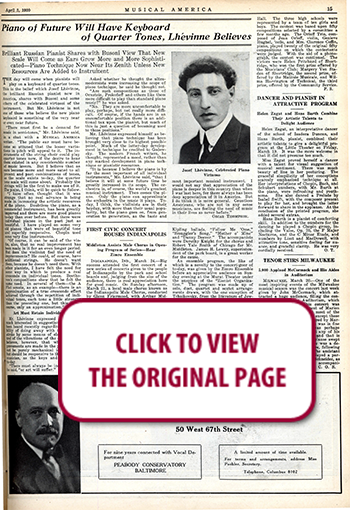 100 YEARS AGO IN MUSICAL AMERICA (334)
100 YEARS AGO IN MUSICAL AMERICA (334)
April 3, 1920
Page 15
Piano of Future Will Have Keyboard of Quarter Tones, Lhevinne Believes
Brilliant Russian Pianist Shares with Busoni View That New Scale Will Come as Ears Grow More and More Sophisticated—Piano Technique Now Near Its Zenith Unless New Resources Are Added to Instrument
THE day will come when pianists will play on a keyboard of quarter tones. This is the belief which Josef Lhevinne, the brilliant Russian pianist now in America, shares with Busoni and some others of the celebrated virtuosi of the instrument. But Mr. Lhevinne is not one of those who believe the new piano keyboard is something of the very near or even near future.
“There must first be a demand for music in semi-tones,” Mr. Lhevinne said, in a chat with a MUSICAL AMERICA writer. “The public ear must have become so attuned that the lesser variations in pitch will appeal to it. The instruments of the string choir could play quarter tones now, if the desire to hear them existed in any considerable number of music lovers. But I believe that as ears become more and more sated to all present and past combinations of tones, as the scale exists to-day, the quarter tone scale will come about. Probably the strings will be the first to make use of it. The piano, I think, will be quick to follow.
“I have often thought that it was strange that no real advance is being made in increasing the artistic resources of the piano. Doubtless the piano, as a commercial instrument, has been greatly improved and there are more good pianos to-day than ever before. But there were individual pianos in the past just as beautiful. I have played on some very old pianos that were of beautiful tone and superbly responsive. Chopin used some very fine instruments.
“Of course, it can be said of the violin, also, that no real improvement has been made in it for an even longer period. But does the violinist feel the need of improvements? He could, of course, have additional strings. He doesn’t want them, because he doesn’t need them. With other pianists, I have felt the need for some way in which to produce a real crescendo on individual tones. Beethoven’s compositions show that he felt the same need. In several of them—the A Flat sonata, as an example—there is an approximation of a true crescendo effect achieved through the repetition of individual tones, each tone a little stronger than the preceding one, but this is, of course, only an approximation.”
Art Must Retain Individuality
Mr. Lhevinne expressed himself as much interested in suggestions that have been heard recently regarding the possibility of doing away with the hammer stroke by some means of electrical control of the vibrations of the strings. He believes, however, that whatever improvements are made in the piano should not be purely mechanical in their use, but should be responsive to the individual musician, as the keys and pedals are to-day.
“There must always be individuality,” he said, “or art will suffer.”
Asked whether he thought the ultra-modernists were increasing the scope of piano technique, he said he thought not.
“Are such compositions as those of Ornstein, Prokofieff and others like them more difficult to play than standard piano music?” he was asked.
“No. They are more uncomfortable to play, perhaps, but not really more difficult. Of course, if the hands are in an uncomfortable position there is an additional tax upon the pianist, but much of this is just a question of becoming used to those positions.”
Mr. Lhevinne expressed himself as believing that piano technique has been brought very close to its highest possible point. Much of the latter-day development in technique he credited to Godowsky. The modern French writers, he thought, represented a mood, rather than any marked development in piano technique or pianistic resources.
“It is because I believe the piano is by far the most important of all individual instruments,” Mr. Lhevinne said, “that I believe it will at some future time be greatly increased in its scope. The orchestra is, of course, the world’s greatest musical instrument. Then comes the piano. Only the piano can approximate the orchestra in the music it plays. Today, I think, the violinists are in their heyday, with more than their usual popularity, but the piano goes on, from generation to generation, as the basic and most important musical instrument. I would not say that appreciation of the piano is deeper in this country than when I was last here, for there always has been deep appreciation of it in America. But I do think it is more general. Countless Americans, who are not in any sense musicians, are feeling the need of music in their lives as never before:” —OSCAR THOMPSON.




 RENT A PHOTO
RENT A PHOTO





